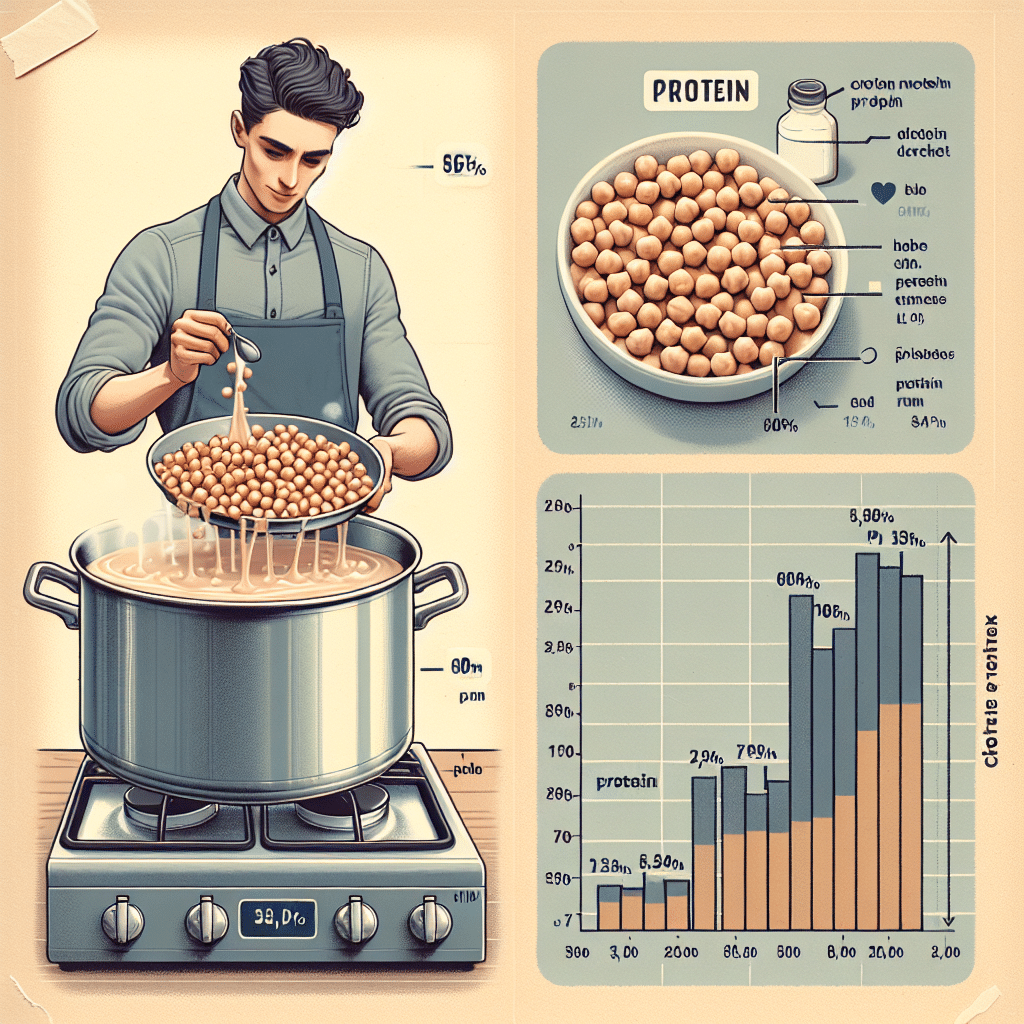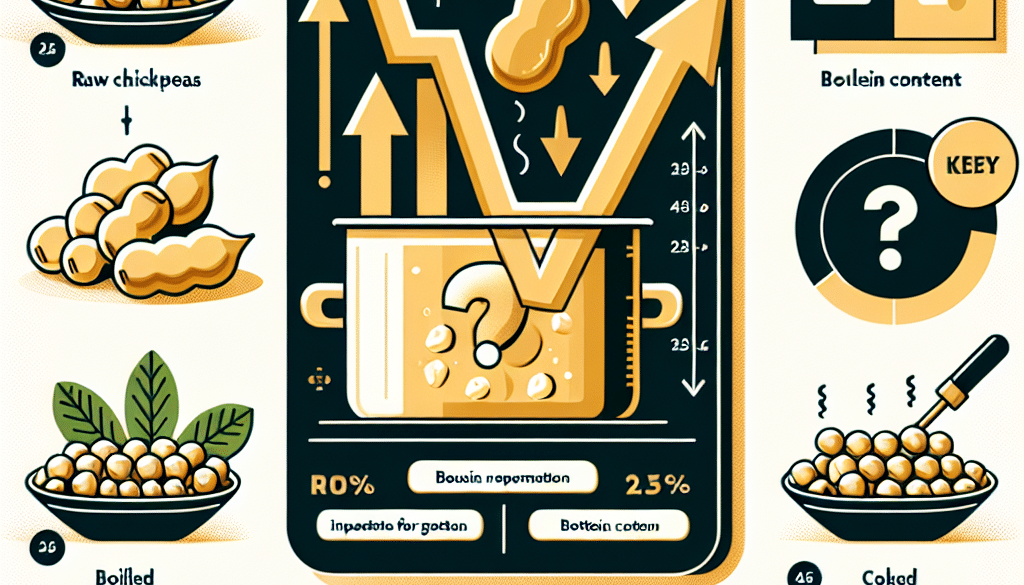Does Boiling Chickpeas Reduce Protein?
-
Table of Contents
- Does Boiling Chickpeas Reduce Protein? Insights and Analysis
- Understanding Protein in Chickpeas
- The Boiling Process and Its Impact on Protein
- Protein Stability at High Temperatures
- Research on Protein Retention in Cooked Chickpeas
- Factors Affecting Protein Content During Boiling
- Maximizing Protein Retention in Chickpeas
- Boiled Chickpeas in a Balanced Diet
- Conclusion: Boiling and Protein Content in Chickpeas
- Discover ETprotein’s High-Quality Protein Products
Does Boiling Chickpeas Reduce Protein? Insights and Analysis

Chickpeas, also known as garbanzo beans, are a staple in many diets around the world. They are prized for their high protein content, making them an excellent choice for vegetarians, vegans, and anyone looking to add more plant-based protein to their diet. However, there is a common concern among health-conscious individuals about whether the cooking process, particularly boiling, affects the protein content of chickpeas. This article delves into the science behind protein retention in chickpeas during boiling and provides evidence-based insights.
Understanding Protein in Chickpeas
Before we explore the effects of boiling on chickpeas’ protein content, it’s important to understand what makes chickpeas such a valuable source of protein. Chickpeas are not only rich in protein but also contain essential amino acids necessary for human health. They are also a good source of dietary fiber, vitamins, and minerals.
The Boiling Process and Its Impact on Protein
Boiling is a common cooking method that involves immersing food in water at high temperatures. It is often used to soften legumes, including chickpeas, making them more palatable and easier to digest. The concern is whether this process leads to a significant loss of protein.
Protein Stability at High Temperatures
Proteins are complex molecules that can be sensitive to changes in temperature. When exposed to heat, proteins can denature, which means they unfold and lose their natural structure. However, denaturation does not necessarily mean that the protein’s nutritional value is diminished. In fact, in some cases, it can make proteins easier for the body to absorb.
Research on Protein Retention in Cooked Chickpeas
Several studies have investigated the effects of cooking on the protein content of legumes. Research indicates that while boiling can cause some water-soluble nutrients to leach into the cooking water, proteins are generally heat-stable and remain largely intact. The consensus is that boiling chickpeas does not significantly reduce their protein content.
Factors Affecting Protein Content During Boiling
While boiling does not drastically reduce the protein content in chickpeas, there are factors that can influence nutrient retention:
- Cooking Time: Overcooking can lead to a greater loss of nutrients. It’s important to follow recommended cooking times to preserve the nutritional value of chickpeas.
- Water Temperature: Boiling at high temperatures can cause more nutrients to leach out. However, proteins are less likely to be affected compared to other nutrients like vitamins.
- Water pH: The acidity or alkalinity of the cooking water can also impact nutrient retention. Using water that is too acidic or too alkaline can affect the protein structure.
Maximizing Protein Retention in Chickpeas
To ensure maximum protein retention when boiling chickpeas, consider the following tips:
- Soak chickpeas before cooking to reduce cooking time.
- Use the minimum amount of water necessary to cover the chickpeas.
- Avoid adding acidic ingredients to the cooking water.
- Minimize cooking time to prevent overcooking.
Boiled Chickpeas in a Balanced Diet
Boiled chickpeas can be a valuable addition to a balanced diet. They provide a substantial amount of protein along with other nutrients. Including chickpeas in meals can contribute to muscle maintenance, tissue repair, and overall health.
Conclusion: Boiling and Protein Content in Chickpeas
In conclusion, boiling chickpeas does not significantly reduce their protein content. While some nutrients may leach into the cooking water, proteins are largely unaffected by the boiling process. By following best practices for cooking chickpeas, you can enjoy their full nutritional benefits. Chickpeas remain a robust source of protein and other essential nutrients, making them a smart choice for those looking to enhance their diet with plant-based proteins.
Discover ETprotein’s High-Quality Protein Products
If you’re looking for additional sources of high-quality protein, consider exploring ETprotein’s range of organic bulk vegan proteins. Their products, including rice protein, pea protein, and various seed proteins, are characterized by a neutral taste, non-GMO, and allergen-free attributes. ETprotein’s offerings cater to a diverse range of industries and dietary needs, ensuring that you have access to the best protein supplements to complement your diet.
About ETprotein:
ETprotein, a reputable protein and L-(+)-Ergothioneine (EGT) Chinese factory manufacturer and supplier, is renowned for producing, stocking, exporting, and delivering the highest quality organic bulk vegan proteins and L-(+)-Ergothioneine. They include Organic rice protein, clear rice protein, pea protein, clear pea protein, watermelon seed protein, pumpkin seed protein, sunflower seed protein, mung bean protein, peanut protein, and L-(+)-Ergothioneine EGT Pharmaceutical grade, L-(+)-Ergothioneine EGT food grade, L-(+)-Ergothioneine EGT cosmetic grade, L-(+)-Ergothioneine EGT reference grade and L-(+)-Ergothioneine EGT standard. Their offerings, characterized by a neutral taste, non-GMO, allergen-free attributes, with L-(+)-Ergothioneine purity over 98%, 99%, cater to a diverse range of industries. They serve nutraceutical, pharmaceutical, cosmeceutical, veterinary, as well as food and beverage finished product distributors, traders, and manufacturers across Europe, USA, Canada, Australia, Thailand, Japan, Korea, Brazil, and Chile, among others.
ETprotein specialization includes exporting and delivering tailor-made protein powder and finished nutritional supplements. Their extensive product range covers sectors like Food and Beverage, Sports Nutrition, Weight Management, Dietary Supplements, Health and Wellness Products, and Infant Formula, ensuring comprehensive solutions to meet all your protein needs.
As a trusted company by leading global food and beverage brands and Fortune 500 companies, ETprotein reinforces China’s reputation in the global arena. For more information or to sample their products, please contact them and email sales(at)ETprotein.com today.














